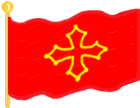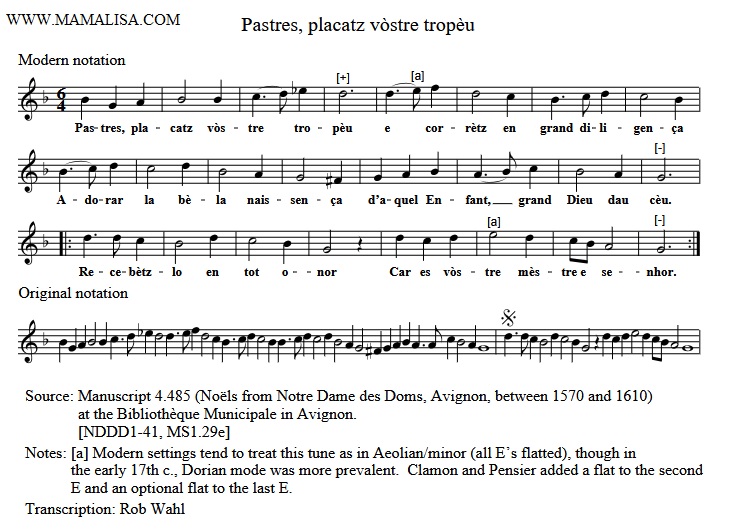Pastres, placatz vòstre tropèu
This carol is one of the carols of Notre-Dame des Doms of Avignon. They are Provençal carols from 1580 - 1610 and from 1653 - 1656. Notre-Dame des Doms is Avignon's cathedral next to the Popes' Palace. The manuscripts are kept in the city library.
You'll find a shorter version of this carol as sung by the Mont-Jòia band on this Mama Lisa's World page.
Pastres, placatz vòstre tropèu
Shepherds, Leave Your Flocks
Christmas Carol
Christmas Carol
(Occitan)
(English)
1 L'àngel:
Pastres, placatz vòstre tropèu
E corrètz en grand diligença
Adorar la bèla naissença
D'aquel Enfant, grand Dieu dau cèu.
Recebètz-lo en tot onor
Car es vòstre mèstre e senhor.
Lei pastres:
Àngel, aquò es tot nòstre desir,
Mai digatz-nos en qué repaire
Es nat, e çò que devèm faire
Qu'eu li pòsca prendre plesir,
E tot çò que nautres poirem,
Per eu de bòn cuòr o farem.
2 L'àngel:
Eu es nat dedins Bethleem,
Desmantelat coma Besoça
Au plus paure estable que fosse
Dins una crupi sus de fen.
Recebètz-lo en tot onor
Car es vòstre mèstre e senhor.
Lei pastres:
Nautres i anarem volontièrs,
Mai voudriam saber per qué causa
Lo filh de Dieu dau cèu repausa
Tant piètre en aquestei quartièrs,
E tot çò que nautres poirem,
Per eu de bòn cuòr o farem.
3 L'àngel:
Eu ven pagar vòstra rançon,
Mai afin d'esquivar l'eclipsi
D'Erodes, rei plen de malici
A fach lo curat de Quinçon.
Recebètz-lo en tot onor
Car es vòstre mèstre e senhor.
Lei pastres:
Totara, sensa tardar plus,
Li anam portar quauqua compòsta,
Beatus garnitus de còsta
E d'abits pro frigoribus,
E tot çò que nautres poirem,
Per eu de bòn cuòr o farem.
4 L'àngel:
D'a pè d'èu, sa maire veiretz
E Sant Josèp servant de paire,
L'ase e lo buòu de l'autre caire
Per vos mostrar çò que faretz.
Recebètz-lo en tot onor
Car es vòstre mèstre e senhor.
Lei pastres:
Àngel, l'i anam d'aqueste pas
Adorar dintre sa logeta
E au sòn de nòstra museta
Fringar davant èu lei cinq pas,
E tot çò que nautres poirem,
Per eu de bòn cuòr o farem.
1. Angel:
Shepherds, leave your flocks
And run in great haste
To adore the beautiful birth
Of this child, great God of Heaven.
Welcome him with great honor
For he is your master and lord.
Shepherds:
Angel, this is all our desire,
But tell us in which lodging
He was born and what we could do
That he would enjoy;
And all that we can do for him,
We'll do willingly.
2. Angel:
He was born in Bethlehem,
Without a coat, like Bezouce, (1)
In the poorest stable that ever could be,
In a manger, on some hay.
Welcome him with great honor
For he is your master and lord.
Shepherds:
We'll willingly go there,
But we'd like to know why
The son of God in Heaven reposes
So shabbily in those districts,
And all that we can do,
For him we'll willingly do.
3. Angel:
He comes to pay your ransom,
But to avoid being eclipsed
By Herod, (the) king full of malice,
He acted like the priest of Quinson. (2)
Welcome him with great honor
For he is your master and lord.
Shepherds:
In a short while, waiting no longer,
We'll go to bring him some compote
Beatus garnitus (3) aside
And clothes pro frigoribus (4)
And all that we can do,
For him we'll willingly do.
4. Angel:
Next to him, you'll see his mother
And Saint Joseph acting as a father,
The ass and the ox on the other side
Showing you what you should do.
Welcome him with great honor
For he is your master and lord.
Shepherds:
Angel, we'll go right away
To adore him in his small lodging,
And, to the sound of our reed,
To dance the five steps in front of him,
And all that we can do,
For him we'll willingly do.
Notes
(1) Bezouce is a small town east of Nimes that was taken initially, and then taken back twice during the Wars of Religion in the 16th century. Both times the Catholics were slaughtered and the town plundered by the Huguenots.
In their version, the band Montjòia replaced Bezouce by Romanhòla (Roumagnole) who was a very poor musicologist.
(2) Quinson is a small town in the Provençal Alps.There's only an old saying "A fach coma lo curat de Quinçon, monsur Raselet" ("He acted like the priest of Quinson, mister Raselet") but I couldn't for the life of me find anything about what this priest might have done. Nevertheless, "faire... monsur Raselet" might be a corruption of "faire monsur Rasclet" which means to run away, to flee, based on the verb "rasclar" which means to scrape, but also to run fast.
(3) Beatus garnitus: Beatus means "happy"; "garnitus" is not Latin from the Middle Ages, this pseudo-Latin word was used to mean "preserved", hence "beatus garnitus de còsta" would mean "happily preserved aside". Rob -who helped me with the translation and the music- found actual Latin texts which used "garnitus", as well as concrete citations of its use to mean "garnished"/"dressed". So he thinks it means, "richly garnished on the side". Besides, by then, "compote" (that you know as apple sauce when it's made with apples) was made of cooked fruit but they would add dry fruits and spices.
(4) "pro frigoribus": against the cold.


Thanks!
Thanks and Acknowledgements
Translated and annotated by Monique Palomares.


























